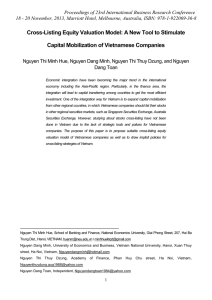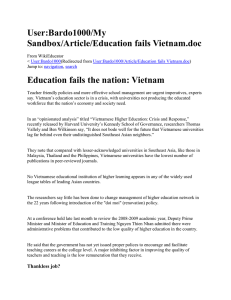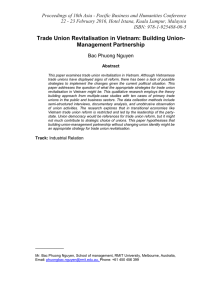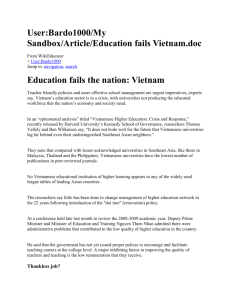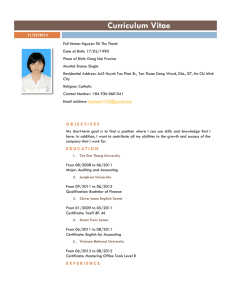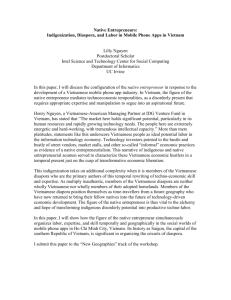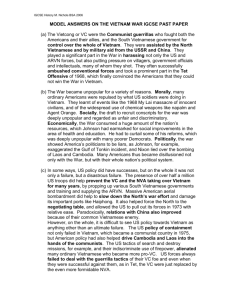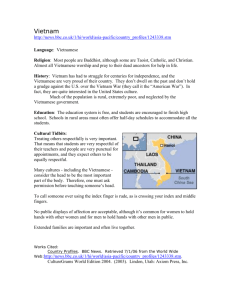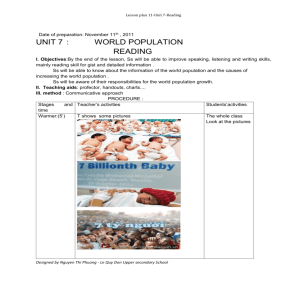DỰ KIẾN MỤC LỤC KHOA HỌC GIÁO DỤC
advertisement
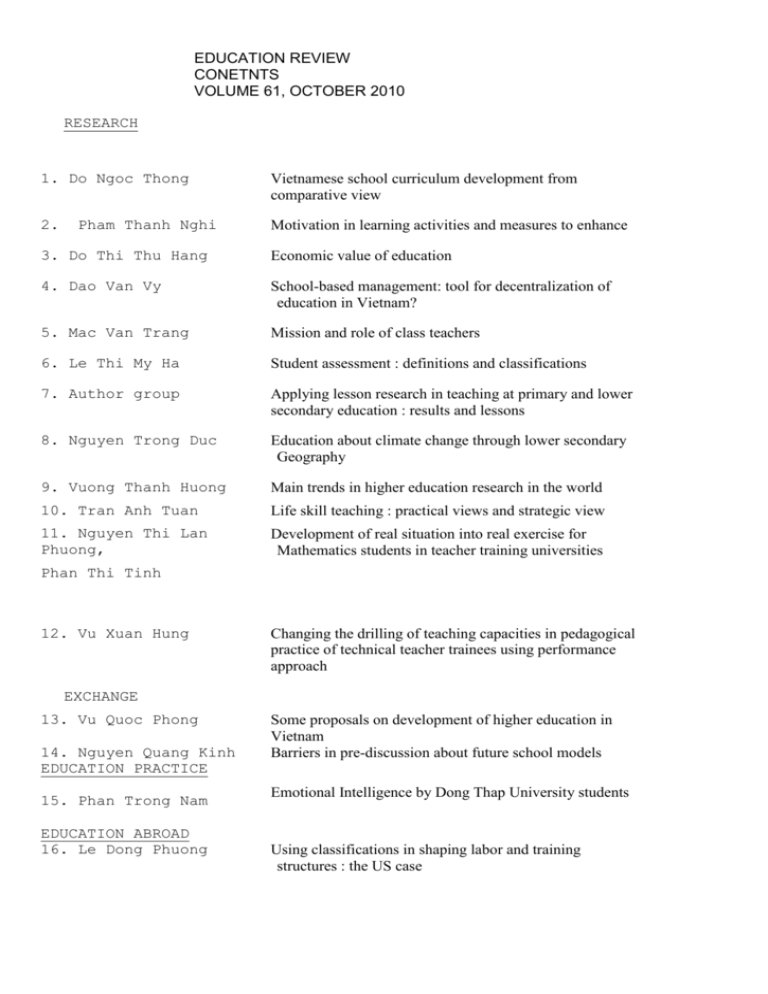
EDUCATION REVIEW CONETNTS VOLUME 61, OCTOBER 2010 RESEARCH 1. Do Ngoc Thong Vietnamese school curriculum development from comparative view 2. Motivation in learning activities and measures to enhance Pham Thanh Nghi 3. Do Thi Thu Hang Economic value of education 4. Dao Van Vy School-based management: tool for decentralization of education in Vietnam? 5. Mac Van Trang Mission and role of class teachers 6. Le Thi My Ha Student assessment : definitions and classifications 7. Author group Applying lesson research in teaching at primary and lower secondary education : results and lessons 8. Nguyen Trong Duc Education about climate change through lower secondary Geography 9. Vuong Thanh Huong Main trends in higher education research in the world 10. Tran Anh Tuan Life skill teaching : practical views and strategic view 11. Nguyen Thi Lan Phuong, Development of real situation into real exercise for Mathematics students in teacher training universities Phan Thi Tinh 12. Vu Xuan Hung Changing the drilling of teaching capacities in pedagogical practice of technical teacher trainees using performance approach EXCHANGE 13. Vu Quoc Phong 14. Nguyen Quang Kinh EDUCATION PRACTICE 15. Phan Trong Nam EDUCATION ABROAD 16. Le Dong Phuong Some proposals on development of higher education in Vietnam Barriers in pre-discussion about future school models Emotional Intelligence by Dong Thap University students Using classifications in shaping labor and training structures : the US case Summary 1. Do Ngoc Thong: This article looks at the school curriculum development process in Vietnam from the comparative view with other countries. The author addresses: 1/ the need for comparative school education, 2/ international comparisons of school education, 3/ school curriculum development process, 4/ discrepancies in Vietnam’s school curriculum development as compared to other countries. 2. Pham Thanh Nghi: The article presents the concept of intrinsic motivation, its components and ways to increase intrinsic motivation in each component of learning. The intrinsic motivation is fueled by students’ psycho-academic needs to control their own decisions (autonomy), to do things that help them feel successful (competence), to feel part of something larger than themselves (belonging and relatedness), to feel good about who they are (self-esteem), and to find pleasure in what they do (involvement and stimulation) 3. Do Thu Hang : The author presents some issues on economic values of education based on the economic perspective, through solving the relations between education – productivity - incomes. 4. Dao Van Vy: Based on the clarification of the concept and the links of ‘schoolbased management’, the author made references to Vietnamese practices, applicability of ‘school-based management’ (incentives and disincentives) the author made 5 recommendations for quick introduction of ‘school-based management’ into Vietnamese schools. 5. Mac Van Trang: Addressing the issues of class teachers in school, the author talks about 1/ mission of class teacher, 2/ role of class teacher (subject teacher and students personality forming educator, advisor, councilor), 3/ proposals for changing the roles of class teachers. 6. Le Thi My Ha: This article gives a common understanding of student’s achievement assessment and assessment classification for use by teachers, administrators in the teaching process, including: initial assessment, formative assessment and summative assessment. 7.Author group: Lesson research has become widely common in school across Japan and many other countries. This model has been tried out, however the scale is still limited. In 2007-09 Can Tho University and Michigan State University has conducted a study on applying the lesson research in primary and lower secondary education in the difficult area and got good results. This article presents some of the findings and related lessons . 8. Nguyen Trong Duc: According to the author Geography in lower secondary school has many possibilities to teach climate change. Climate change education in geography is seen in integration, mostly links. The selection of lessons and lessons units as well as the integration degree is important to avoid overload and pressure on students. 9. Vuong Thanh Huong: This article presents 6 main focuses in higher education studies, those are globalization and higher education, R&D in higher education, privatization in HE, HE management and world class universities. The author proposes some topics for HE research in Vietnam in the current time. 10.Tran Anh Tuan: The author overviews the picture of life skill education in Vietnam and makes lessons and orientations for the introduction of life skills education into Vietnamese schools, and more concrete for the design of a life skill program by Ministry of Education and Training. 11: Nguyen Lan Phuong : According to the author lecturers could develop the ability to transform a real situation into real exercise by students by 3 approaches: looking at real situations from various perspectives, developing real situations into real exercises with new theoretical approaches, extending the real situations; these areas very important in applied Mathematics. 12.Vu Xuan Hung: This article presents study on drilling of teaching abilities in pedagogical practice by technical teacher trainees using performance approach. The study clarifies characteristics and hindrances for teaching ability drilling in pedagogical practice among technical teacher trainees based on performance approach on goal, content, process and assessment changes for improved quality. 13. Vu Quoc Phong: Based on the observations from universities in Vietnam, former Soviet union, USA, Germany, France, Japan, Taiwan, Korea and some other countries the author proposes some measures, ‘to be done right-away’, which would help the higher education to develop. . 14. Nguyen Quang Kinh : The author discusses 5 major difficulties in making predictions about future school models: 1/ uncertainty about what happens to Vietnamese education in 10-15 years from now, 2/ lack of reliable data for forecasting of socio-economic future, 4/ huge gaps between development among regions, areas and the diversity of schools, 5/ contradiction between phase characteristics and the constant truth of education jobs. 15.Phan Trong Nam : This article presents results of a study about EI among Dong Thap University students. A survey by 1st to 4th year students from Mathematics, Linguistics and Preschool education shows that more than half of the surveyed students have higher than average EI. The 2nd year students have the best EI while the preschool education group get the highest scores. This will have good implications for the teaching at university education subjects for higher quality of learning. 16. Le Dong Phuong : The USA is very experienced in standardization of classification schemes. For the time being American authorities are using various classification schemes for the specialization and professions of the manpower. This approach is a good one, worth of attention by Vietnamese agencies, especially when Vietnam is involved in the globalization of education and labour market. This article briefs readers about the three mian classification being used in the US, namely the Classification of Instructional Programs (CIP), the Standard Occupational Classification (SOC) and North American Industry Classification System (NAICS) as well as their applications.
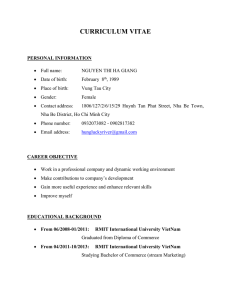
![vietnam[1].](http://s2.studylib.net/store/data/005329784_1-42b2e9fc4f7c73463c31fd4de82c4fa3-300x300.png)
